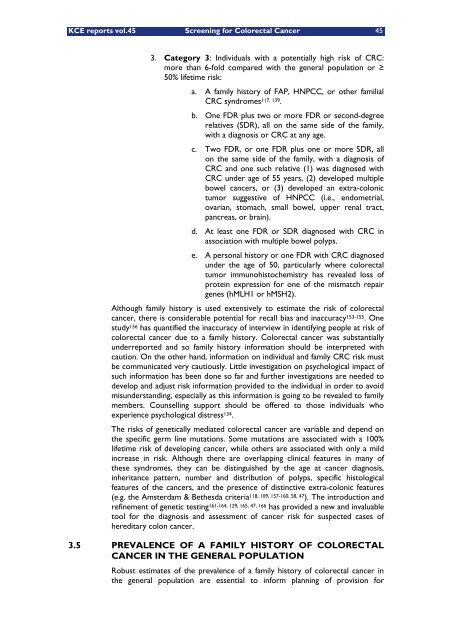Report in English with a Dutch summary (KCE reports 45A)
Report in English with a Dutch summary (KCE reports 45A)
Report in English with a Dutch summary (KCE reports 45A)
You also want an ePaper? Increase the reach of your titles
YUMPU automatically turns print PDFs into web optimized ePapers that Google loves.
<strong>KCE</strong> <strong>reports</strong> vol.45 Screen<strong>in</strong>g for Colorectal Cancer 45<br />
3. Category 3: Individuals <strong>with</strong> a potentially high risk of CRC:<br />
more than 6-fold compared <strong>with</strong> the general population or <br />
50% lifetime risk:<br />
a. A family history of FAP, HNPCC, or other familial<br />
CRC syndromes117, 139.<br />
b. One FDR plus two or more FDR or second-degree<br />
relatives (SDR), all on the same side of the family,<br />
<strong>with</strong> a diagnosis or CRC at any age.<br />
c. Two FDR, or one FDR plus one or more SDR, all<br />
on the same side of the family, <strong>with</strong> a diagnosis of<br />
CRC and one such relative (1) was diagnosed <strong>with</strong><br />
CRC under age of 55 years, (2) developed multiple<br />
bowel cancers, or (3) developed an extra-colonic<br />
tumor suggestive of HNPCC (i.e., endometrial,<br />
ovarian, stomach, small bowel, upper renal tract,<br />
pancreas, or bra<strong>in</strong>).<br />
d. At least one FDR or SDR diagnosed <strong>with</strong> CRC <strong>in</strong><br />
association <strong>with</strong> multiple bowel polyps.<br />
e. A personal history or one FDR <strong>with</strong> CRC diagnosed<br />
under the age of 50, particularly where colorectal<br />
tumor immunohistochemistry has revealed loss of<br />
prote<strong>in</strong> expression for one of the mismatch repair<br />
genes (hMLH1 or hMSH2).<br />
Although family history is used extensively to estimate the risk of colorectal<br />
cancer, there is considerable potential for recall bias and <strong>in</strong>accuracy 153-155. One<br />
study 156 has quantified the <strong>in</strong>accuracy of <strong>in</strong>terview <strong>in</strong> identify<strong>in</strong>g people at risk of<br />
colorectal cancer due to a family history. Colorectal cancer was substantially<br />
underreported and so family history <strong>in</strong>formation should be <strong>in</strong>terpreted <strong>with</strong><br />
caution. On the other hand, <strong>in</strong>formation on <strong>in</strong>dividual and family CRC risk must<br />
be communicated very cautiously. Little <strong>in</strong>vestigation on psychological impact of<br />
such <strong>in</strong>formation has been done so far and further <strong>in</strong>vestigations are needed to<br />
develop and adjust risk <strong>in</strong>formation provided to the <strong>in</strong>dividual <strong>in</strong> order to avoid<br />
misunderstand<strong>in</strong>g, especially as this <strong>in</strong>formation is go<strong>in</strong>g to be revealed to family<br />
members. Counsell<strong>in</strong>g support should be offered to those <strong>in</strong>dividuals who<br />
experience psychological distress 134.<br />
The risks of genetically mediated colorectal cancer are variable and depend on<br />
the specific germ l<strong>in</strong>e mutations. Some mutations are associated <strong>with</strong> a 100%<br />
lifetime risk of develop<strong>in</strong>g cancer, while others are associated <strong>with</strong> only a mild<br />
<strong>in</strong>crease <strong>in</strong> risk. Although there are overlapp<strong>in</strong>g cl<strong>in</strong>ical features <strong>in</strong> many of<br />
these syndromes, they can be dist<strong>in</strong>guished by the age at cancer diagnosis,<br />
<strong>in</strong>heritance pattern, number and distribution of polyps, specific histological<br />
features of the cancers, and the presence of dist<strong>in</strong>ctive extra-colonic features<br />
(e.g. the Amsterdam & Bethesda criteria 118, 109, 157-160, 58, 47). The <strong>in</strong>troduction and<br />
ref<strong>in</strong>ement of genetic test<strong>in</strong>g 161-164, 129, 165, 47, 166 has provided a new and <strong>in</strong>valuable<br />
tool for the diagnosis and assessment of cancer risk for suspected cases of<br />
hereditary colon cancer.<br />
3.5 PREVALENCE OF A FAMILY HISTORY OF COLORECTAL<br />
CANCER IN THE GENERAL POPULATION<br />
Robust estimates of the prevalence of a family history of colorectal cancer <strong>in</strong><br />
the general population are essential to <strong>in</strong>form plann<strong>in</strong>g of provision for

















